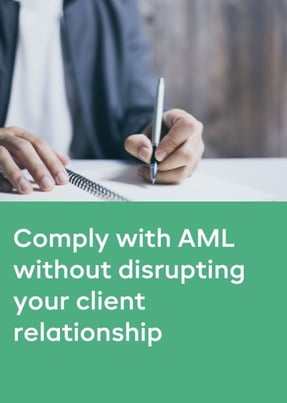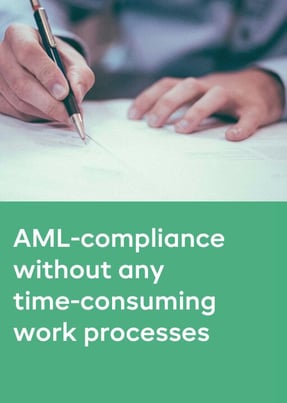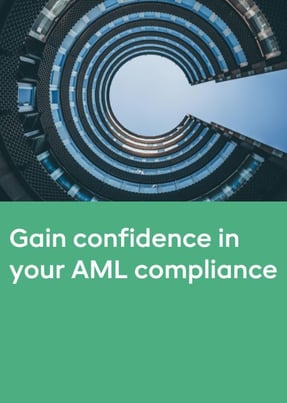- Products
- RegLab for ...
- Knowledge centre
Download the AML glossary >
 Discover the essential AML compliance terminology and gain instant access to a comprehensive guide
Discover the essential AML compliance terminology and gain instant access to a comprehensive guide - The company
Working at RegLab >
Join RegLab as the new Product Owner of our software tool and change the way the legal community approaches anti-money laundering.
There may not be any vacancies that perfectly match your profile, but that does not mean there is no room for someone who can improve RegLab.
- Book a demo
What is the AML Directive?
AML (Anti Money Laundering) is the term for the international legislation on which the Dutch Money Laundering and Terrorist Financing Prevention Act is based. At European level, this legislation is known as the AML Directive (AMLD). Below, we explain what this legislation entails and how it relates to AML.
What is AML?
AML stands for Anti Money Laundering, i.e. the prevention of money laundering. Previously, the implementation of an anti-money laundering policy was self-directed. With the introduction of European and national legislation, organisations are now obliged to check their relationships for money laundering practices. At European level, this is done through a series of directives, the Anti-Money Laundering Directives (AMLDs). These have been tightened up step by step over the years. We are now in the sixth version: the Sixth Anti-Money Laundering Directive (6AMLD). This contains clear, binding guidelines for recognising and combating money laundering practices, which all EU Member States are obliged to incorporate into their own legislation.
In the Netherlands, these principles are laid down in the Money Laundering and Terrorist Financing Prevention Act (AML). If your organisation is subject to AML, you must perform a Customer Due Diligence check on your business relations. The KYC policy is central to this.
Under the AMLD, you are obliged to:
- Establish the identity of clients;
- Perform a UBO check;
- Assess risk profiles;
- Report unusual transactions to FIU-Netherlands.
Some AML facts at a glance:
- More and more organisations are putting AML high on their list of priorities in order to prevent reputational damage.
- Not only the financial sector, but also other sectors such as real estate and the legal sector are taking AML seriously.
- Organisations mainly focus on the “front end” of their processes, such as client onboarding. However, we are seeing more and more organisations shifting their focus to constant monitoring of clients.
From AMLD1 to AMLD6
Since 1991, the European Anti-Money Laundering Directives (AMLDs) have formed the basis of European policy against money laundering and terrorist financing. Each directive builds on the previous one and adapts to new risks and developments:
- This began with the First Anti-Money Laundering Directive (1AMLD) in 1991, which stipulated that financial institutions, such as banks, must carry out customer due diligence (KYC) and report suspicious transactions.
- This was followed in 2001 by the 2AMLD, which extended the scope to sectors such as the legal profession and accountants. With this, the EU wanted to respond to the changing methods of money laundering, which were increasingly taking place outside the “traditional” areas.
- With the 3AMLD, in force since 2006, the rules were tightened considerably. Not only financial institutions, but also sectors such as notaries and estate agents were required to perform KYC. In addition, the term “PEP” was introduced, which required extra vigilance.
- The 4AMLD, which came into force in 2017, brought a major innovation: institutions had to adopt a risk-based approach/risk policy. This required them to assess for themselves which customers or transactions might be risky and to tailor their controls accordingly. It also became mandatory to record information about UBOs in national registers.
- The 5AMLD, which came into force in 2020, further expanded the regulations. This directive places particular emphasis on greater transparency and prevention. Examples include the introduction of UBO registers, stricter rules for crypto service providers and more intensive monitoring of politically exposed persons (PEPs). Cooperation between national supervisory authorities was also strengthened in order to better combat money laundering, and the FIU was given greater access to data.
- Finally, in 2018, the 6AMLD was introduced, which became mandatory in 2021. This directive focused primarily on the harmonisation of criminal law within the EU. Within this directive, 22 “predicate offences” were defined that could form the basis for money laundering. Member States were required to impose higher minimum penalties for money laundering offences and extended liability to legal entities and individuals who may be indirectly involved in money laundering practices. These rules have been in force in all EU Member States since 2021.
What is the difference between an AML check and a UBO check?
An AML check is a check for money laundering risks. It involves investigating whether a (business) relationship is involved in money laundering or other financial crime. This may concern natural persons, companies, or the Ultimate Beneficial Owner (UBO) of an organisation.
A UBO check is therefore an important part of a full AML check.
Future of AML: European AML Regulation
The EU is working on a new AML regulation, which will apply directly in all Member States. Part of this is the establishment of the Anti-Money Laundering Authority (AMLA). This European supervisory authority will supervise the largest and most risky financial institutions. In addition, the AMLA also has a coordinating role: it will supervise the national supervisory authorities with the aim of harmonising and ensuring the application of anti-money laundering rules in all Member States.
RegLab for AML Directive
Do you also spend a lot of time on Know Your Customer and Customer Due Diligence policies to comply with the obligations under the Wwft? Despite the frustrations they cause, KYC principles are becoming increasingly important. RegLab helps organisations to comply with the laws and regulations surrounding KYC policy quickly, safely and with ease.
Themed file: fully prepared for the supervisor’s audit
This article is part of a number of articles and downloads that will help you prepare yourself for the supervisor’s visit. This content is based on a supervisor's FAQs during an audit. Do you want to be 100% AML-proof and ready for the supervisor’s visit? Find all FAQs in our Knowledge Centre.
Knowledge centre
Download the AML glossary
Gain instant access to the AML glossary and essential compliance terminology.





